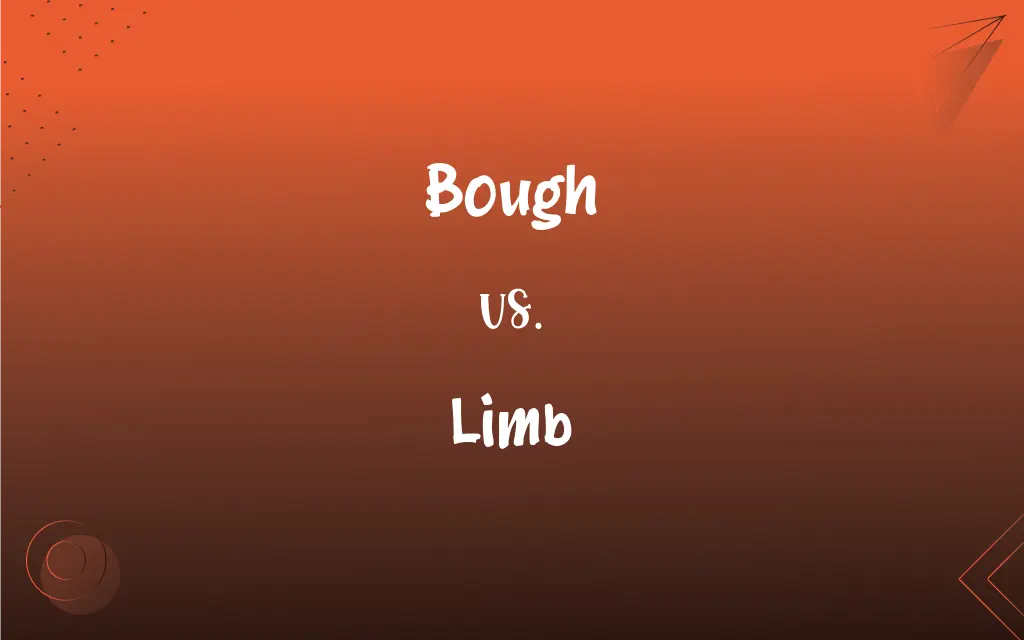Bough vs. Limb: What's the Difference?
By Harlon Moss & Aimie Carlson || Updated on May 23, 2024
Bough refers to a large main branch of a tree, while limb can refer to any branch of a tree, regardless of size.

Key Differences
Bough refers to a large main branch of a tree, typically one that is substantial and prominent. It is often used when describing sturdy branches that form the primary structure of a tree's canopy. Limb, on the other hand, can refer to any branch of a tree, regardless of its size, encompassing both large boughs and smaller branches.
Boughs are integral to the structure of the tree, often supporting numerous smaller branches and leaves. They are significant and easily noticeable parts of the tree. Limbs can be large like boughs, but they can also be smaller branches. Thus, the term limb is more general and can refer to any part of the tree extending from the trunk.
Boughs typically grow directly from the trunk and are essential for the tree's overall architecture and stability. Limbs might grow from the trunk or from boughs themselves, showing the hierarchical structure within a tree. In everyday language, boughs are often associated with their strength and robustness, whereas limbs might be mentioned when discussing the entirety of a tree's branching system.
Boughs are often used in literary or poetic contexts to evoke the image of a majestic tree. They symbolize strength and shelter. Limbs are more commonly used in a variety of contexts, including practical discussions about tree trimming, damage from storms, or climbing.
Boughs, due to their size and significance, are less frequently broken or pruned compared to limbs. Limbs are more likely to be pruned or removed, especially if they pose a hazard or obstruct pathways.
ADVERTISEMENT
Comparison Chart
Definition
Large main branch of a tree
Any branch of a tree
Size
Generally large and prominent
Can be any size, large or small
Growth
Directly from the trunk
From trunk or boughs
Context
Often literary or poetic
Practical and general usage
Pruning
Less frequently pruned
More commonly pruned
ADVERTISEMENT
Bough and Limb Definitions
Bough
A large main branch of a tree.
The old oak tree had a thick bough extending over the road.
Limb
A part of a tree extending from the trunk or bough.
The storm broke several limbs off the tree.
Bough
A substantial and prominent branch.
The children swung from the sturdy bough.
Limb
A branch, regardless of size.
Squirrels darted across the limbs in the forest.
Bough
A major limb that supports smaller branches.
Birds nested in the high boughs of the tree.
Limb
A general term for branches of a tree.
The arborist examined each limb for signs of disease.
Bough
A strong, large branch.
The bough cracked under the weight of the snow.
Limb
One of the larger branches of a tree.
Bough
A tree branch, especially a large or main branch.
Limb
One of the jointed appendages of an animal, such as an arm, leg, wing, or flipper, used for locomotion or grasping.
Bough
A tree-branch, usually a primary one directly attached to the trunk.
Limb
An extension or a projecting part, as of a building or mountain range.
Bough
A gallows.
Limb
An extension or part distinguished from the main body or group
The conservative limb of the party.
Bough
An arm or branch of a tree, esp. a large arm or main branch.
Limb
A member or representative of a group
Was arrested by a burly limb of the law.
Bough
A gallows.
Limb
(Archaic)An impish child.
Bough
Any of the larger branches of a tree
Limb
(Astronomy)The circumferential edge of the apparent disk of a celestial body.
Bough
A significant part of a tree's canopy.
The boughs provided ample shade in the summer.
Limb
(Mathematics)The edge of a graduated arc or circle used in an instrument to measure angles.
Limb
(Botany)The expanded tip of a plant organ, such as a petal or corolla lobe.
Limb
To remove the branches from.
Limb
A major appendage of human or animal, used for locomotion (such as an arm, leg or wing).
Limb
A branch of a tree.
Limb
(archery) The part of the bow, from the handle to the tip.
Limb
An elementary piece of the mechanism of a lock.
Limb
A thing or person regarded as a part or member of, or attachment to, something else.
Limb
(astronomy) The apparent visual edge of a celestial body.
The solar limb
Limb
(on a measuring instrument) The graduated edge of a circle or arc.
Limb
(botany) The border or upper spreading part of a monopetalous corolla, or of a petal or sepal; blade.
Limb
(transitive) To remove the limbs from (an animal or tree).
They limbed the felled trees before cutting them into logs.
Limb
(transitive) To supply with limbs.
Limb
A part of a tree which extends from the trunk and separates into branches and twigs; a large branch.
Limb
An arm or a leg of a human being; a leg, arm, or wing of an animal.
A second Hector for his grim aspect,And large proportion of his strong-knit limbs.
Limb
A thing or person regarded as a part or member of, or attachment to, something else.
That little limb of the devil has cheated the gallows.
Limb
An elementary piece of the mechanism of a lock.
Limb
A border or edge, in certain special uses.
Limb
To supply with limbs.
Limb
To dismember; to tear off the limbs of.
Limb
One of the jointed appendages of an animal used for locomotion or grasping: arm; leg; wing; flipper
Limb
Any of the main branches arising from the trunk or a bough of a tree
Limb
(astronomy) the circumferential edge of the apparent disc of the sun or the moon or a planet
Limb
Either of the two halves of a bow from handle to tip;
The upper limb of the bow
Limb
The graduated arc that is attached to an instrument for measuring angles;
The limb of the sextant
Limb
Any projection that is thought to resemble an arm;
The arm of the record player
An arm of the sea
A branch of the sewer
Limb
Any branch of a tree.
He climbed out onto the limb to retrieve his kite.
Limb
Any tree branch that may need pruning.
The gardener trimmed the lower limbs for better growth.
FAQs
What is a limb?
A limb is any branch of a tree, regardless of size.
Can bough and limb be used interchangeably?
Not exactly; bough refers to larger branches, while limb can refer to any branch.
Where does a bough grow?
A bough typically grows directly from the trunk of the tree.
What is a bough?
A bough is a large main branch of a tree.
Is bough a common term?
Bough is more commonly used in literary or descriptive contexts.
Is limb a common term?
Yes, limb is commonly used in everyday language.
Can a bough be small?
No, boughs are generally large and substantial.
Are limbs often pruned?
Yes, limbs are more commonly pruned, especially if they are hazardous.
Where does a limb grow?
A limb can grow from the trunk or from boughs themselves.
Do boughs support smaller branches?
Yes, boughs often support numerous smaller branches.
Are boughs often pruned?
Boughs are less frequently pruned compared to limbs.
Are boughs structurally important?
Yes, boughs are integral to the tree’s structure and canopy.
Are limbs structurally important?
Limbs contribute to the overall structure but include both major and minor branches.
Can a limb be large?
Yes, limbs can be large like boughs or small.
Can bough refer to an entire tree’s branching system?
No, bough specifically refers to large branches.
Do limbs include smaller branches?
Yes, limbs can refer to smaller branches as well.
What contexts are limbs used in?
Limbs are used in practical and general discussions about trees.
What contexts are boughs used in?
Boughs are often used in poetic or descriptive contexts.
Can a limb grow from a bough?
Yes, limbs can grow from both the trunk and boughs.
Can limb refer to an entire tree’s branching system?
Yes, limb can refer to all branches of a tree.
About Author
Written by
Harlon MossHarlon is a seasoned quality moderator and accomplished content writer for Difference Wiki. An alumnus of the prestigious University of California, he earned his degree in Computer Science. Leveraging his academic background, Harlon brings a meticulous and informed perspective to his work, ensuring content accuracy and excellence.
Co-written by
Aimie CarlsonAimie Carlson, holding a master's degree in English literature, is a fervent English language enthusiast. She lends her writing talents to Difference Wiki, a prominent website that specializes in comparisons, offering readers insightful analyses that both captivate and inform.































































